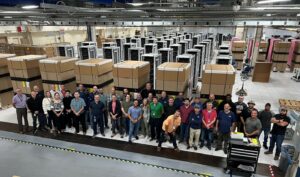I recently visited our Franklin, Massachusetts, factory, one of our homes to top technological talent who integrate, test and ship our Dell Integrated Racks for AI. We are currently ramping Franklin factory capacity to build thousands of AI servers a week shipping to North America customers from this facility alone. This additional integration capacity is critical as we deliver pre-racked, at-scale solutions that help customers of all sizes – from enterprise to cloud service providers (CSPs) – see AI results faster.
The Franklin factory customizes specific integration and testing on our rack solutions based on customers’ unique needs. This includes Dell’s Direct Liquid Cooling (DLC) technology featured in our new XE9680L servers, giving our customers more energy efficient AI enterprise solutions. These servers offer at least 50% cooling energy savings over traditional air-cooled servers for 25% improved thermal performance¹.
I recently shared the 10-year journey we’ve been on as a pioneer in liquid cooling innovation, but to see firsthand the scale of these systems and to understand their power is amazing. The speed at which our supply chain team addressed customer demand for AI servers – both air cooled and liquid cooled – is impressive.
Our long-standing supplier relationships enable access to the powerhouse microprocessors needed to run large language models, and our supply chain has mobilized to meet market demand. Our customers want AI servers, and when we saw a trend toward more requests for pre-racked systems, configured to their specifications and tested before delivery to their data centers, we adapted our facilities. In essence, we can deliver pre-built AI-enabled server racks with the latest technology faster than ever before.
When Dell and EMC joined forces in 2016, we became the world’s leading end-to-end enterprise technology provider. Since 1998, our Franklin facility has embodied the spirit of innovation and cutting-edge technologies. It was opened as a manufacturing and test hub, where every product was built to meet specific customer needs. It has maintained that spirit through the years and is currently our largest North American manufacturing facility.
The technological landscape will continue to evolve, and so will we! It is an exciting and demanding time for IT leaders and teams. They are facing pressures to act quickly to support AI workloads while navigating rising energy costs, sustainability regulations and energy use reporting requirements. Dell’s unique and differentiated combination of innovation across R&D, sales, services and supply chain makes AI easy for our customers.
Congratulations and a huge thank you to our Franklin team for 26 years of innovation and excellence. Thanks for having me.

1 Based on Dell internal engineering estimates, September 2024.

